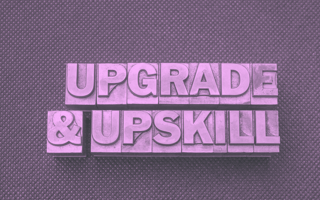Nearly a million professionals in the United States right now would tell you that unemployment is not a temporary side-effect of the coronavirus pandemic.
Those who have been jobless for more than 27 weeks are considered long-term unemployed, as defined by The Bureau of Labor Statistics. In the U.S., long-term unemployment is on track to become a national crisis carrying into 2021. While companies still sort out how to recover from the economic recession, those who are furloughed or laid off carry the burden.
Being out of work is not just a financial crisis. For many professions, skills atrophy — the loss of general skills that can become obsolete over time — sets in, and professional networks begin to disappear or become outdated. After being out of work for several months, it’s easy to fall into a rut. The best way to come out of this experience and make a positive change is to take proactive steps to keep your skills sharp and stay in touch with your network.
Online Networks Create Long-Term Opportunities
Network, network, network! Because of the internet, we can build, expand and sustain networks better than ever before. Millions of jobs have been lost, yet, at the same time, specific industries are hiring more quickly than ever. During the 2008 financial crisis, long-term unemployment led to a loss of confidence. In the 2020 pandemic, this has been exacerbated due to physical isolation, causing people to develop insecurities toward their professional skills.
Your next opportunity might not be in the same industry as your last job. Using resources like LinkedIn, Slack groups, online conferences and meet-ups can help you see where your skills are needed right now — or how you may need to reskill to stay current. The sooner you can be open about your situation and talk to former colleagues and peers, the more likely they can help you, potentially pass along job leads or connect you with resources.
Upskill to Stay Current and Competitive in Your Industry
Keeping in touch with your network isn’t enough on its own. You have to find ways to prove to potential employers that you’ve been working to keep your skills fresh. Start by updating your resume and engaging with current events and innovations in your industry. As you apply to new jobs, you’ll learn where you can upskill. Be honest with potential employers about how you’ve used the prolonged period of unemployment. Companies want to see how you filled the gaps between this potential job and the last. Make it a practice to look at job descriptions and identify one skill to brush up on before the interview.
The digital economy requires constant upskilling to remain competitive. Anything you can do independently to hone your skills will take you a lot farther than you would imagine. Ways to keep your skills sharp include:
- Volunteering with local nonprofits who could use your skills (building a website, analyzing data, etc.).
- Working on a contract project through one the many freelancing websites.
- Are you a data analyst or coder? Try taking bootcamp courses covering the newest skills or at least shorter classes on specific topics.
Anything that shows initiative on your resume is a competitive advantage. It indicates that you have pursued opportunities that increase knowledge for the job you want, while helping your overall employability and staving off skills atrophy.
Reskill Where Jobs Are Now and Will Be Tomorrow
Though it can be hard, it’s always worth trying to find the silver lining. The global shutdown due to COVID-19 has offered one of the biggest “just-give-me-a-sign” moments for people who were unhappy in the jobs they had. This is a perfect time to reskill. We’re already seeing a trend toward reskilling and a new focus on skills-based employment.
Melissa, a recent student in our UX design track at Springboard, was able to go from working in business analytics to becoming a UX designer for the U.S. Air Force within three weeks of completing the program. She is an excellent example of a person seeing an opportunity in reskilling to where the jobs are in this new market. For anyone who has been debating reskilling, here’s your sign.
Many businesses are seeing the value in offering reskilling options to current or former employees as well.
Maintain a Positive Mindset and a Healthy Lifestyle
During these difficult times, it is important to find ways to stay optimistic. A daily meditation and exercise routine that helps find clarity and focus while working from home is a great start. But maybe for you, it will be pottery, playing piano or jumping on the Peloton. No wrong answers — just creative ways to stay positive, because job searching is not easy. A study by The Urban Institute found that maintaining personal well-being during unemployment is one of the first things to decay. According to their findings, “63 percent of long-term unemployed skipped dental visits, 56 percent put off needed health care and 40 percent reported not filling a prescription.”
So much of your experience being unemployed — whether short- or long-term — is out of your control. Allowing yourself a break from job searching, networking and brushing up on your skills is vital. Don’t feel wasteful for blocking out time each day to read a book or go for a walk. It’s an essential part of this process. When the job opportunity arises, you want to be sure that you project energy, enthusiasm and a positive mindset.
The key to all of this is to be proactive and do not trick yourself into giving up. No matter how long it takes, you will find the right career if you keep pushing yourself forward. At times, it will feel hopeless and frustrating, but companies will take notice of your determination and resilience — as long as you stay positive and keep persevering.





